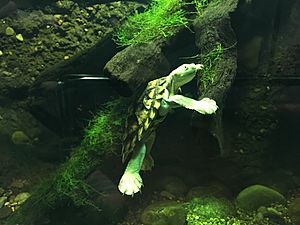Bellinger River snapping turtle facts for kids
Quick facts for kids Bellinger River snapping turtle |
|
|---|---|
 |
|
| Conservation status | |
| Scientific classification |
|
| Kingdom: | Animalia |
| Phylum: | Chordata |
| Class: | Reptilia |
| Order: | Testudines |
| Suborder: | Pleurodira |
| Family: | Chelidae |
| Genus: | Myuchelys |
| Species: |
M. georgesi
|
| Binomial name | |
| Myuchelys georgesi (Cann, 1997)
|
|
| Script error: The function "autoWithCaption" does not exist. | |
| Synonyms | |
|
|
Script error: No such module "Check for conflicting parameters".
The Bellinger River turtle (Myuchelys georgesi) is a special kind of turtle. It belongs to the family called Chelidae. This turtle is not very big. Female turtles can grow up to 24 centimeters (about 9.5 inches) long. Males are a bit smaller, reaching about 18.5 centimeters (about 7 inches). This unique turtle lives only in Australia. Specifically, it is found in the small Bellinger River in New South Wales. In the past, there were many of these turtles. However, a serious illness caused a big problem for them.
Contents
Why is it Called the Bellinger River Turtle?
The scientific name for this turtle is Myuchelys georgesi. The second part of its name, georgesi, honors an Australian expert on reptiles and amphibians named Arthur Georges.
Where Does the Bellinger River Turtle Live?
The Bellinger River turtle, Myuchelys georgesi, lives only in the Bellinger River. This river is located in the middle-eastern part of New South Wales, Australia. It also lives in the smaller streams that flow into the Bellinger River.
What Kind of Home Does This Turtle Like?
The Bellinger River turtle prefers to live in the deeper parts of the river. It likes areas where the water is clear and flows all the time. These parts of the river often have a rocky bottom. There are also many boulders, pebbles, and gravel.
This turtle can breathe underwater in a special way. It uses its cloaca (a body opening) to take in oxygen from the water. This is possible because the water in its habitat has lots of oxygen. It also has very few small particles floating in it.
What Does the Bellinger River Turtle Eat?
The Bellinger River turtle is an omnivore. This means it eats both plants and animals. It mostly eats small creatures that live on the riverbed. These creatures do not move around much. The turtle also eats some fruits that fall into the water. It also eats some water plants.
How Does the Bellinger River Turtle Reproduce?
Bellinger River turtles lay their eggs from October to December. A female turtle usually lays between 10 and 15 eggs. The eggs are white and have a hard shell. They are also oblong, which means they are longer than they are wide.
Why is This Turtle in Danger?
The Bellinger River turtle lives in a very small area. Even within this area, it faces many threats.
- Habitat changes: People sometimes change the river's natural environment. This can make the water dirty or fill it with mud.
- Predators: The European fox, which is not native to Australia, hunts these turtles.
- Competition: Another type of turtle, the Emydura macquarii, was recently introduced. It competes with the Bellinger River turtle for food and space.
In 2015, a very serious virus affected the turtles. More than 90% of the adult turtles died because of this illness. This means the turtle is now almost gone from the wild.
What is Being Done to Help?
Scientists and conservation groups are working hard to save the Bellinger River turtle. They have started special breeding programs. These programs aim to raise healthy turtles in safe places. The goal is to release them back into the river. This will help to bring the population back up.
Images for kids
 | Valerie Thomas |
 | Frederick McKinley Jones |
 | George Edward Alcorn Jr. |
 | Thomas Mensah |




